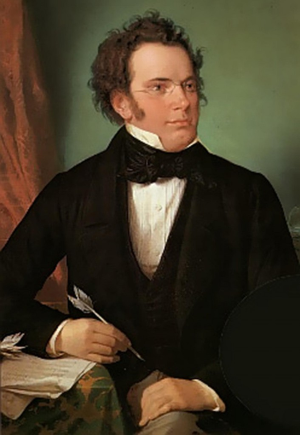
Schubert’s Winter Journey
This May, pianist Stewart Kelly and tenor Douglas Kelly bring to life Franz Schubert’s great song cycle Winterreise (Winter Journey) in the Centre’s intimate Primrose Potter Salon. Stewart shares his personal connection and admiration for the work with us ahead of the performance.
‘Why do I avoid the roads that other travellers take, and seek hidden paths over the rocky, snow-clad heights?’
So asks our protagonist in ‘Der Wegweiser’ (‘The Signpost’), the 20th song in Winter Journey. I don’t know about you, but it’s certainly a question I’ve symbolically asked myself many times over the years, and it is this song perhaps above all the others that draws me most to this extraordinary piece.
Schubert’s Winter Journey, composed in the final year of his life as he struggled with poor health, is a crowning achievement in Western art. Over 24 songs, Schubert weaves a universal and timeless story of lost love and rejection. The stark winter setting provides a powerful literal and metaphorical backdrop to the story.

We begin with our man leaving his love in the middle of the night, tiptoeing out of the house.
We don’t really know why he must run but it is evident that he is feeling rejected and decides to leave, heartbroken that it hasn’t worked, before he is asked to go.
What follows is the journey of reflection, wallow and self-discovery that is doubtless familiar to most. We travel with him, an invisible companion and witness, as he searches for and returns to places of happy memories with his love, processes his grief, looks ahead optimistically to the arrival of spring and the renewal it brings, eagerly awaits the postman in case he hears from her, and then slowly moves on as he realises that chapter has closed.

Equally vital to Schubert’s perfect music are the texts that come from poetry by Wilhelm Müller, with whose work Schubert had a deep affinity. The piece was actually composed in two halves. Schubert discovered a compilation volume of Müller’s work with 12 of the poems and set them in February of 1827, only discovering later that there were 12 more in the Winterreise story that he completed in October of the same year.
Schubert had been seriously sick for some years and had an awareness that his days were numbered. Several close friends wrote about how melancholic he was. The nobleman Joseph von Spaun asked him why, and diarised the reply:
‘Come to Schober's today and I will play you a cycle of terrifying songs; they have affected me more than has ever been the case with any other songs.’ He then, with a voice full of feeling, sang the entire Winterreise for us. We were altogether dumbfounded by the sombre mood of these songs, and Schober said that one song only, ‘Der Lindenbaum’, had pleased him. Thereupon Schubert leaped up and replied: ‘These songs please me more than all the rest, and in time they will please you as well.’
Schubert was spot on in his prediction that this piece would find a dedicated following among music lovers and that it would haunt generations of artists, summoning the greatest singers and pianists of our times.
You only need to observe the list of solo pianists who have recorded this piece but otherwise never perform song repertoire (to greatly mixed results!) to understand just what an allure it has. Similarly, many superstars of the opera house will agree to a Winterreise while rarely otherwise stepping onto the song platform.
The immense musical and technical demands placed upon both artists ensure that a complete Winterreise is a relatively rare experience in Melbourne. A night out with this piece can hardly be sold as a rip-roaring and uplifting experience, but I can promise if we do our jobs correctly it is a profoundly moving 70 minutes. Cathartic. Even therapeutic. Two musicians and an audience connected in a shared journey of vulnerability, frailty and the power of friendship and human connection. An ageless story and message more relevant today than ever.
‘Signposts stand on the roads, pointing towards the towns; and I wander on, relentlessly, restless, and yet seeking rest.’ ‘The Signpost’ from Winterreise, D.911
Translations of Wilhelm Müller by Richard Wigmore – Oxford Lieder.
Pianist Stewart Kelly and tenor Douglas Kelly perform Winterreise in the Primrose Potter Salon on Tuesday 11 May. Click here to find out more and to book tickets.
You might also be interested in
-
-
-
Explore the program notes in advance

